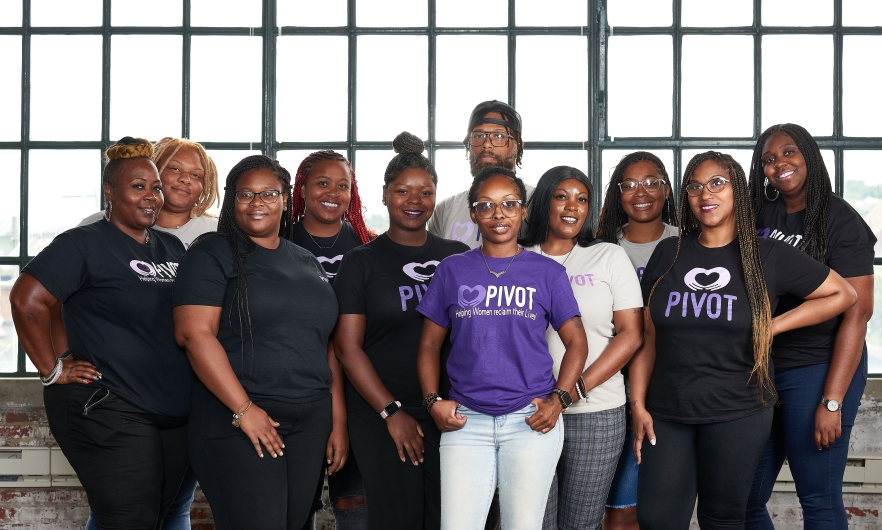Employment and low recidivism among women participating in Baltimore re-entry program

Pivot Organization Team
Johns Hopkins Bloomberg School of Public Health researchers report that only 8% of justice-impacted women who complete PIVOT, a holistic workforce development program, are re-arrested within one year. Developed in 2018, PIVOT is a non-profit that provides the only re-entry services specifically tailored towards women in Maryland. This evaluation of PIVOT was funded by the 2022 Baltimore Health Equity Impact Grant from the Johns Hopkins Urban Health Institute.
PIVOT runs a nine-week workforce development, personal development, and case management program supporting justice-impacted women. The program provides tailored programming to help women reclaim their lives, reunite with their families, and rebuild their communities. Researchers assessed key outcomes of program completion, post-program employment, and one-year recidivism, and reviewed over 2,800 case notes to better understand the mechanisms underlying the program’s positive outcomes. The research team included Carla G. Tilchin, MSPH, PhD Candidate and lead author; Audrey E. Thomas, MSPH student and lead qualitative analyst; and Carl A. Latkin, Professor and Vice Chair in the Department of Health, Behavior and Society and senior author.
“Most programming to reduce recidivism is designed for men and doesn’t take into account the unique needs and strengths of women,” said Tilchin, the lead author on the study. “This evaluation demonstrates that PIVOT’s gender-informed programming is effective and provides additional insight into why it is important to have programs specifically designed for women.”
The research team discovered that 75% of the enrolled participants successfully completed PIVOT. Among people who completed the program, 71% of women received employment placement, 57% received employment training, and 8% were re-arrested on a new charge within one year, with 1% being reincarcerated. Individuals who completed PIVOT were significantly less likely to be rearrested on a new charge than those who did not complete PIVOT. Comparatively, national estimates suggest that 58% of women are re-arrested and 30% of women are reincarcerated within three years.
Five programmatic themes emerged based on an analysis of case notes: addressing the whole person, understanding women's unique challenges, supporting mental health and substance abuse recovery, providing empowerment-oriented workforce development, and matching high needs with high support.
“While PIVOT is not based on any specific re-entry models, these qualitative results demonstrate that PIVOT is providing evidence-based programming,” says Thomas, the lead qualitative analyst on the study. “The case notes show what it really means to take an empowerment-oriented approach and understand how to balance accountability with genuine support.”
This report is the first evaluation of the PIVOT program and adds to the limited body of evidence on community-based re-entry programming. “We aim to provide all the supports women need not just to get a job but to really feel happy with the life they are creating for themselves after incarceration,” says Veronica Jackson, the Executive Director of PIVOT. “We do this work every day but we never have the opportunity to look at the data and see that the data really is a reflection of the work.”
In collaboration with Tilchin, PIVOT recently launched a quasi-experimental study to examine the differences between women enrolled in PIVOT and women on the waitlist. This forthcoming evaluation will provide a more rigorous and comprehensive understanding of the effect of PIVOT on women’s re-entry.
Mixed Methods Evaluation of PIVOT, A Community-Based Re-Entry program for Women in Baltimore City.
Community Partner: Veronica Jackson, Executive Director, PIVOT, Inc. To read their report, click here.
